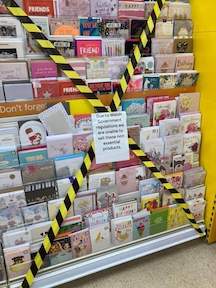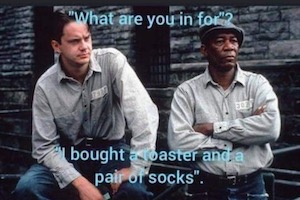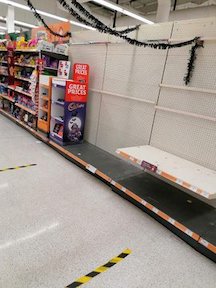Coronavirus Wales
Supermarkets and other shops in Wales: essential and non-essential goods
Summary
1.Welsh Government guidance is incorrect when it says that “people should not leave home to buy any goods that aren’t essential during the firebreak“. People may leave home if it is reasonable to do so.
2.It is perfectly lawful for supermarkets to display and sell birthday cards and other non-essential goods.
3.The test is not whether goods are “essential” or “non-essential”: it is whether premises may remain open because they are exempted from closure by Part 3 of Schedule 1 to The Health Protection (Coronavirus Restrictions) (No. 3)(Wales) Regulations 2020.
4.Supermarkets, convenience stores, corner shops, newsagents and post offices (among many others) are all exempted and may display and sell anything which they or another exempted shop may.
Do Birthday Cards Cost Lives?
The sealing-off of shelves in supermarkets and other shops in Wales, because they display “non-essential goods” for sale, has caused both outrage and ridicule in equal measure – with only a few clinging to the mantra “it will save lives”. These photographs, as they say, speak a thousand words –



Quite how, if I am lawfully shopping in a supermarket or convenience store, my purchase of a birthday card is going to endanger lives, is not immediately apparent – particularly when set alongside the fact that I am permitted to purchase a wide variety of other items, including alcohol and cigarettes, in that same shop.
The absurdity of it has caused the First Minister, Mark Drakeford, to announce a review of the so-called “ban” on selling non-essential goods, to make sure “common sense is applied”. I would respectfully suggest a good starting point for revision might be his government’s ‘Guidance’, published Friday, 23 October; much of which, in addition to being clumsily written and confusing in its own right, has no basis in law.
Essential and non-essential purchases
The guidance mounts a pincer-attack against the purchase of non-essential goods: first by mis-stating the regulations as to when people are allowed to leave home, and second by a misleading explanation as to the products which shops that are are allowed to remain open may display and sell. The first limb of the pincer is aimed at the customer, and asserts –
“People should not leave home to buy any goods that aren’t essential during the firebreak period”.
There is no such prohibition in law. The regulations published on Thursday 22 October (the day before the Guidance) allow me to leave my home if it is reasonable to do so. Regulation 3(1) provides –
“No person in Wales may, without reasonable excuse, leave the place where they are living or remain away from that place”
What is reasonable will depend on a miscellany of different circumstances. The regulations do not attempt to close the list of reasonable excuses. Subparagraph (2) of regulation 3 gives examples, merely, of what will amount to a reasonable excuse. They include, but are not restricted to, the need to purchase food and also “supplies for the essential upkeep, maintenance and functioning of the household”. There is nothing in the regulations to prevent my leaving home to buy ‘non-essential food’. Nor is there anything in the regulations to prevent my buying, while I am on my food-shopping trip, anything else lawfully on the shelves of a supermarket. It does not need to be “essential”.
The second limb of the Guidance’s pincer movement is aimed at the retailer, not the customer, and it is the assertion –
“…shops that sell multiple products should not be allowed to sell products sold by a shop that has been required to close.”
The word “should” is unfortunate: it gives the impression that the guidance on this point is aspirational. In the context of what follows, however, the passage can only be read as proscriptive. See, for example –
“Businesses which would normally sell a range of products in their stores may only sell those items which fall into the [permitted] categories…
“… those parts of a store selling electrical goods, telephones, clothes, toys and games, and products for the garden should be closed to the public – and these products should not be sold.”
Once again, the guidance misrepresents the law, albeit more subtly than it does when explaining (if that is the appropriate word) regulation 3. The guidance’s preoccupation with prohibiting the sale of specified products is misconceived: the regulations are principally concerned with the closure of the premises of certain businesses – and, as will be seen, the distinction is important.
The Health Protection (Coronavirus Restrictions) (No. 3)(Wales) Regulations 2020
It is helpful to cite the regulations in some detail. First there is the default position given by regulation 11(1) –
11.—(1) A person responsible for carrying on a business or providing a service which is listed in Part 1 of Schedule 1 must—
(a) close to members of the public any premises operated as part of the business or service, and
(b) not carry on the business or service at such premises otherwise than in accordance with this regulation.
Note that it is the closure of premises that is required. Premises are defined as “including any building or structure and any land”. There is no equivalent of the Licensing Act 2013 definition that “premises means any place”.
Part 1 of Schedule 1 lists a number of “business or services whose premises must be closed”. It is sufficient for the present purposes to cite “Any business selling goods or services for sale in a shop, including (a) homeware stores.”
Important exceptions to the default position are given by regulation 15 –
Businesses and services whose premises may be open
Open premises
15.—(1) Despite the preceding provisions of this Part, premises operated by businesses or services listed in Part 3 of Schedule 1 may continue to be open.
Part 3 of Schedule 1 lists a number of businesses whose premises are permitted to remain open for the purpose of the business in question, notwithstanding regulation 11(1). They include food retailers, supermarkets, convenience stores and corner shops; as well as newsagents and post offices; and building supplies and hardware stores.
What the regulations call “mixed businesses” are dealt with by regulation 16.
Mixed businesses
16.—(1) Where—
(a) a person responsible for carrying on a business (“business A”) is required, by virtue of regulation 11(1)… to cease carrying on business A at premises, and
(b) business A forms part of a larger business (“business B”),
the requirement in regulation 11(1)… is complied with if the person responsible for carrying on business B ceases to carry on business A at the premises.
It can immediately be seen that the regulations do not attempt a division of products into “essential” and “non-essential”. The division is between businesses which must close, businesses which may remain open, and mixed businesses which comprise those which must close and those which may remain open. In the latter case, a mixed business may remain open if it ceases to carry on that side of its business which the regulations say must not be carried on.
There is no prohibition against carrying on two or more businesses each of which is permitted to remain open. A permitted business – such as a supermarket – which sells food and a selection of things sold by other businesses permitted to remain open – such as newsagents, post offices and hardware stores – may lawfully offer for sale all products usually sold by those other businesses; and its customers may lawfully purchase them, whether they are essential or not. The birthday cards in the above photographs, which a newsagent and post office sells, may lawfully be sold in a supermarket. Of course they may! So may anything which a convenience store or corner shop or hardware store or even bicycle shop sells: and that is quite a range. “Essential” and “non-essential”do not come into it: they are inventions of the Guidance.
I cannot wind up this piece without mentioning one of the reasons put forward for the prohibition against a shop which is allowed to open selling items usually sold in premises required to close: namely, “to minimise unfair distortion of competition between similar businesses”.
The source of the power to make regulations of the draconian kind under consideration is Section 45(C) of the Public Health (Control of Diseases) Act 1984, which is in these terms –
45C Health protection regulations: domestic
(1)The appropriate Minister may by regulations make provision for the purpose of preventing, protecting against, controlling or providing a public health response to the incidence or spread of infection or contamination in England and Wales (whether from risks originating there or elsewhere).
It is strongly arguable that protecting prohibited businesses from perceived unfair competition from permitted businesses is an improper motive for making the recent regulations; and that they are for that reasons, to that extent, ultra vires and unlawful.
Gerald Gouriet QC
Francis Taylor Building
Inner Temple
See also: Clash between Guidance and Regulations
[…] The post can be read in full here: https://licensing-lawyer.co.uk/coronavirus-restrictions-wales/ […]
[…] A more detailed discussion of the regulations can be found via this link: Coronavirus Restrictions in Wales […]